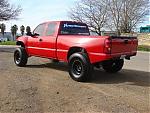When you choose a fire extinguisher, you need to keep in mind what it will be used for. Or what it might need to be used for. It can be a life threatening mistake to use the wrong extinguisher on the wrong fire.
Here is the list of different extinguisher classes.
Class A fires - the most common type, are ordinary combustibles such as wood, paper, cloth, rubber and many plastics.
Class B fires - flammable liquids, gases and greases.
Class C fires - energized electrical equipment or wiring where the electric non-conductivity of the extinguishing agent is important. However, when the equipment or wiring is de-energized, remaining combustion is Class A or B and extinguishers for those fires may be safely used.
Class D fires - combustible metals such as magnesium, titanium, zirconium, sodium and potassium. Class D fires are very uncommon. I have only seen 1 in about 100 fires. It was a old VW and the motors are magnesium. Burning magnesium and water = a hell of a fire works display. You may find trace amounts in the doors and steering columns.
Class A is a water extinguisher.They will be in a silver can. and are easy to recharge. Don't use water on electrical, gasoline, grease, or metal fires. serious injury or death may result.
Class B is a Liquid-grease extinguisher.You wont see allot of these because ABC works just as good and works on more fires.
Class C is a electrical equipment extinguisher.Once again Not commonly seen because ABC's are used for most fires.
Class D is a very expensive metal extinguisher.when you need it though, nothing is better.
If you need one for your vehicle, the best thing to get is a ABC extinguisher.
They will put out almost any fire you will commonly see. Everything from wood to electrical fires. On gasoline fires on a flat surface remember '' BACK AND FORTH QUICK. '' You have to paint off the fire quickly so it doesn't go around the spray and reignite the gasoline.
Here is how not to put out a gasoline fire. He didn't follow directions. YouTube - fire
Here is the right way... if you do it right it should only take about 2-4 seconds to put out. YouTube - fire Don't put your life at risk for a vehicle. Our motto is '' Risk little to save a little, Risk allot to save allot. '' A vehicle is considered a little. A life is allot.
enjoy



 Reply With Quote
Reply With Quote










